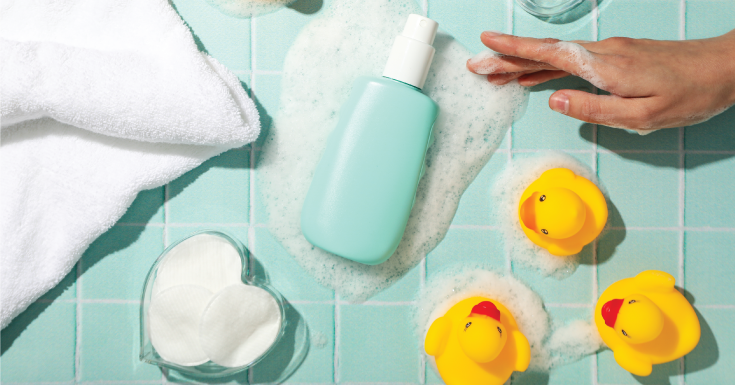A baby’s skin and scalp, including that fine head of hair, are all more sensitive and delicate than we may think. While there are loads of baby washes and shampoos available out there, all being advertised as safe and gentle enough for a baby’s skin and hair, don’t be too quick to make your choice. Many still do contain some harmful ingredients that may cause rashes, redness and itchy skin – all of which we know you do not want for your precious bundle of joy. So, before you pick out a bath product for your little one, read this!
Just the same as adults, a baby’s skin is also his or her biggest organ. Chemicals from products used on their skin get absorbed before making their way into their bloodstream! As alarming as this may sound, if we are not using organic bath products, we may be used to this by now, safe for the odd itch and rash. But, a baby’s skin is still exceptionally sensitive, delicate, and more permeable than ours. This makes it particularly absorbent and prone to irritation and allergies.
Baby Body Washes: The milder, the better
A baby wash tends to cover a large area of a baby’s tiny body; hence it would be a good idea to pay extra attention to the product you choose for your baby’s bath time. Having said that, how often should that be? Once a day? Twice, perhaps? Or, as some parents or grandparents might advise, maybe a couple of sponge baths a day would suffice instead, especially if a baby isn’t too dirty, and/or has been spending a lot of time in an air-conditioned room. In any case, for newborns, sponge baths are recommended as the main method of bathing until the umbilical cord stump falls, and even for the first few months of life or at least until they are mobile enough to move around and get dirty.
So, coming back to baby washes, it is worth knowing that a baby’s skin is slightly acidic, and that’s why the general advice would be to select a baby body wash which is mild, with a pH value between 4 and 7. Remember that baby body washes with pH value greater than 7, or alkaline-based, may strip away precious natural oils from a baby’s skin, resulting in it getting dry, itchy, and over-sensitive. Newborns also have tear ducts which are yet to develop fully, and are immature. This means that they are not able to secrete any tears to protect their eyes. Hence, it is always best to ensure that the bath product you choose for your baby is a tear-free one, and does not sting or irritate the eyes.
Baby Shampoo: How much should you use?
Some babies are born with a head full of hair, while others are born with less, or even bald! Whichever is the case with your own baby, there will surely come a time when you will find yourself wondering how often you should shampoo your baby’s hair, or even if you need tio at all. Here is where we say, whatever your motherly instincts say, go with that, for it is rarely wrong. As a rough guide though, twice a week of very mild shampooing will suffice for infants, for again, as with bathing cleanse their skin, their hair too does not get all that dirty in the first place, which means, daily shampooing is not necessary.
The baby shampoo you choose for your baby’s hair should also be mild – a baby does not sweat that much, nor gets very dirty, as he is yet to even move around on his own. Hence, there is absolutely no need for any heavy-duty hair-cleansing product. And, just a little bit of shampoo will suffice! Always check out the ingredients list, and look out for any harmful or unwanted ingredients. As a general guide, any ingredient which is quite difficult to spell, for instance, is probably not suitable for using on a baby’s delicate scalp and hair.
More and more parents these days are also looking into using organic baby bath products on their precious newborn, mainly to prevent their young ones’ skin from coming into contact with harmful ingredients. Using organic baby washes, shampoo, etc, means that they can be assured of exposing their young ones’ skin to only safe, pure and natural ingredients.
Here are a few ingredients to keep away from, and why:
Parabens: These are chemicals that interfere with the endocrine system and have a weak hormonal effect. They can also irritate the skin.
Fragrance/ Parfum: This is a vague term that can hide hundreds of unknown chemicals, some of which may disrupt hormones like phthalates.
Phthalates can affect fertility, especially in boys, when exposed at a young age.
Methylisothiazolinone (MI): This is a common cause of severe allergic reactions and dermatitis.
Fragrance derived from natural organic essential oils may be safer, yet it may still be irritating the skin. If the label does not specify that the fragrance comes from a natural essential oil, then avoid it. And, when in doubt about the kind of essential oils that your baby’s skin can tolerate, talk to your paediatrician first.


